India's Biofuel Revolution: Ethanol and Isobutanol Lead the Way
India intensifies its shift from fossil fuels, focusing on ethanol and isobutanol for petrol and diesel blending. Despite setbacks with ethanol-diesel blends, efforts continue. Biofuels from various sources like sugarcane and corn aim to reduce oil imports, increase local production, and provide affordable energy solutions.

- Country:
- India
In a significant move to decrease reliance on fossil fuels, the Indian government has introduced E20 petrol but faced challenges with ethanol-diesel blends. Union Minister for Road Transport and Highways, Nitin Gadkari, announced on Thursday that blending efforts are now focused on isobutanol, an ethanol derivative.
E20, a blend containing 20 percent ethanol primarily from sugarcane and grains, replaced E10 and was rolled out nationwide by April 2025. While addressing the India Sugar & Bio-Energy Conference, Gadkari dismissed criticisms of the ethanol program as unfounded and baseless, noting the Supreme Court's dismissal of related challenges.
India's push for biofuel production aligns with its status as the world's second-largest sugar producer and the third-largest crude oil importer. With 85 percent of fossil fuels imported, biofuels are crucial for energy independence. Concurrently, efforts are underway to expand biogas use in tractors and aviation, with production sourced from corn, bamboo, and more.
- READ MORE ON:
- India
- Biofuel
- Ethanol
- Isobutanol
- Fossil Fuels
- Petrol
- Diesel
- Nitin Gadkari
- E20
- Energy
ALSO READ
U.S. Energy Secretary Dismisses Climate Concerns Amid Drive for Fossil Fuels
Mahindra's Commitment to E20 Fuel: A Safe Transition for Petrol Engines
EU Faces Challenges in Phasing Out Russian Fossil Fuels Amid New Sanctions
Citgo Petroleum's Ownership Battle Heats Up
Tecpetrol Awaits Economic Stability for Investment Surge










